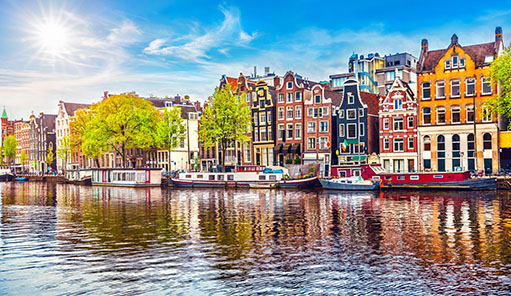
Quality of life in the Netherlands
The Netherlands currently ranks second in global quality of life indexes, and it’s easy to see why. Expats report high satisfaction with the Dutch healthcare system, which is renowned for its accessibility and efficiency. What’s more is the reliable network of trains, buses, trams, and bicycle lanes make getting around straightforward and stress-free.
Dutch cities are also some of the cleanest and safest around the globe. Whether you’re considering the bustling streets of Amsterdam, or the more laid-back vibe of Eindhoven, safety and cleanliness are typically a given.
Working in the Netherlands as an expat

For those looking to enhance their careers, the Netherlands offers a vibrant job market, particularly in the technology, engineering, and international business sectors. Cities like Amsterdam and Rotterdam are major hubs for global trade and have a thriving expat community, making networking easier for newcomers.
There are several online platforms that specifically cater to expats seeking employment in the Netherlands. Websites like Expatica Jobs and IamExpat provide plenty of job listings across various industries.
Culture in the Dutch workplace is often viewed positively by expats. It promotes a good work-life balance and offers a flat organisational structure, which encourages all employees to voice their opinions and ideas.
What’s more, the Netherlands offers favourable conditions for expat workers, through the 30% ruling tax advantage for qualified employees. This allows for a portion of your salary to be tax-free for the first five years of your stay, making the financial transition smoother.
Cost of living in the Netherlands
While the Netherlands offers numerous benefits, it is also important to consider the cost of living, which can be relatively high, especially in Amsterdam. However, when compared to other major European cities like Paris or London, the overall cost of living is reasonable.
According to Numbeo, the average Dutch monthly income after tax is €3,216.09 (2024), with rent being one of the largest expenses. A single person can expect their average monthly costs (rent excluded) to be around €954, while a family of four should budget €3,331.80.
You can also expect higher energy bills with the colder Netherlands climate, which makes heating essential during winter. The table below gives you an idea of how much you’ll need to make it through the month in 2024. Accommodation prices are dependent on their location and proximity to amenities. You can imagine fierce competition due to a high demand to secure more affordable rentals.
| Accommodation | The Netherlands | Amsterdam |
| One-bedroom Apartment Outside city centre | €1350 – €1900 | €1250– €2000 |
| One-bedroom Apartment in City centre | €1450 – €2000 | €1600 – €2500 |
| Three-bedroom Apartment Outside city centre | €1600 – €2250 | €2100 – €3500 |
| Three-bedroom Apartment in City centre | €1750 – €3250 | €2600 – €4500 |
| Markets | The Netherlands | Amsterdam |
| Milk (1 litre) | €1 | €2 |
| Dozen Eggs | €4 | €5 |
| Chicken Breasts (1kg) | €14 | €15 |
| Bottle of Wine (Mid-Range) | €6 | €7 |
| Restaurants | The Netherlands | Amsterdam |
| Cappuccino | €3 | €5 |
| Coca-Cola (330ml) | €3 | €4 |
| Meal for 2 at a mid-range restaurant (3-course) | €70 | €85 |
| Local Draught (500ml) | €5 | €7 |
| Utilities and Transportation | The Netherlands | Amsterdam |
| Basic Utilities (Electricity, Heating, Cooling, Water, Garbage) | €221 | €260 |
| Mobile Phone Monthly Plan (Calls and 10GB Data) | €23 | €23 |
| Fuel (1 litre) | €1.87 – € 2.20 | €1.87 – € 2.20 |
| Monthly Transportation Pass | €68- € 120 | €82 |
| Childcare | The Netherlands | Amsterdam |
| International Primary School for 1 child (Yearly) | €7312 | €7100 – €25000 |
Understanding the cost of living in the Netherlands is crucial for anyone considering making the move. While some aspects of Dutch life may be more expensive than what you’re accustomed to, the overall quality of life and the benefits provided by social services contribute to a lifestyle that many find rewarding.
Healthcare in the Netherlands
By law, the Dutch public healthcare system is accessible to everyone. Residents (expats included) access primary medical care by purchasing basic health insurance from private insurance companies. The Dutch government regulates these policies to ensure they are affordable and provide a standard level of care.
If you’ve used medical services, you’ll first need to pay a deductible (€385 in 2024) before you can claim from your policy. Your insurance will then pay out the balance of your medical costs and any additional costs you incur in that calendar year, even if you need primary care more than once.
Most Dutch residents also have insurance for secondary medical care like dentistry and alternative medicine. Your employer may contribute to the cost of private insurance as part of your employment benefits, but it’s not mandatory and varies depending on the employer and the terms of the employment contract.
The table below provides an overview of the Dutch healthcare system:
| Aspect | Public Healthcare | Private Healthcare |
| Services Provided | Covers GP visits, most medical treatments, hospitalisation, maternity care, and prescription medications. | Covers dental care for adults, alternative therapies, better hospital room accommodation, etc. |
| Costs | Funded by mandatory health insurance premiums (paid by individuals) and partially by income-dependent contributions. | Costs vary by plan and services offered. Premiums are in addition to mandatory public insurance premiums. |
| Out-of-Pocket Expenses | Deductibles apply to some services like prescription drugs and hospital visits (excluding GP visits and maternity care). | Additional costs depend on specific services and level of coverage chosen beyond public healthcare requirements. |
| Provider Access | Patients generally choose a primary care physician who manages referrals to specialists within the network. | Allows access to private clinics and specialists, often with reduced waiting times. |
| State Involvement | The state regulates the public healthcare system and ensures its funding through taxes and premiums. | Private healthcare operates alongside public healthcare but is less regulated by the state. |
Overall, the combination of accessibility, quality, and patient-centred care makes the Dutch healthcare system a standout example of healthcare done right.
Cultural adjustment and expat communities in the Netherlands

Adjusting to a new culture is always a challenge. Expat communities in cities like Amsterdam, Utrecht, and The Hague offer a warm welcome to newcomers and can be crucial in helping you settle in. These communities also provide a platform to meet new people and learn about Dutch culture. English is widely spoken, particularly in business contexts, so you will not face the language barrier that can be a significant hurdle in other countries.
With its high standard of living, excellent job opportunities, and high-quality healthcare, the Netherlands holds great appeal for those considering an expat lifestyle. However, like any country, it comes with its own set of challenges, such as the high cost of living and the need for cultural adjustment.
If you’re contemplating moving to the Netherlands, weigh these factors carefully against what you value most in your personal and professional life. For many, the benefits of living in the Netherlands far outweigh the challenges, making it an excellent choice for expats from around the world.
Ready to make the Netherlands your new home? Contact AGS Global Solutions Netherlands today to make your relocation smooth and stress-free.


















